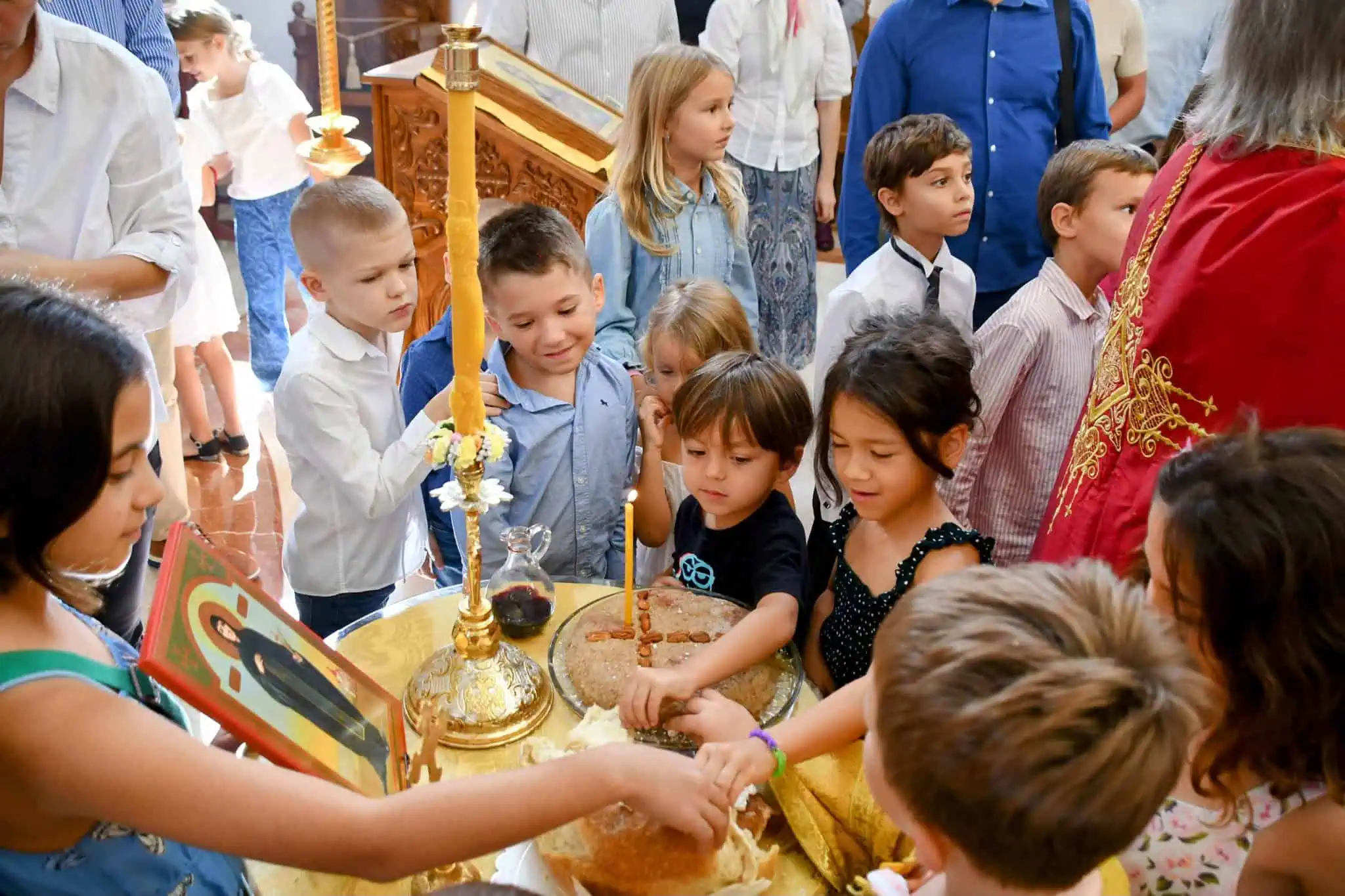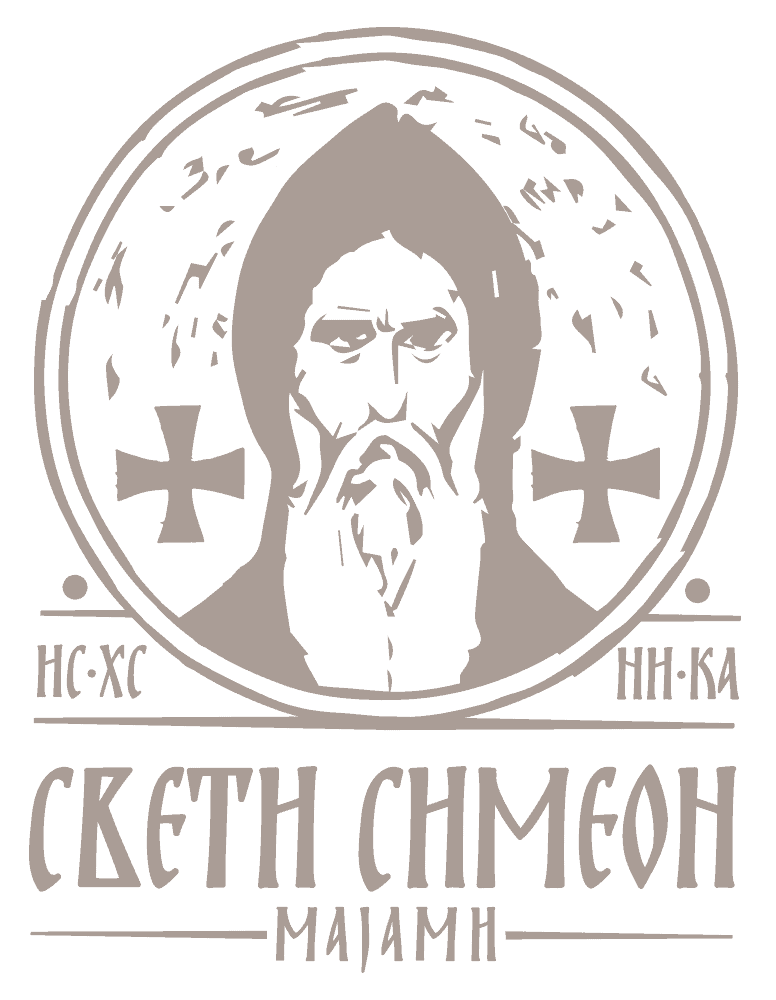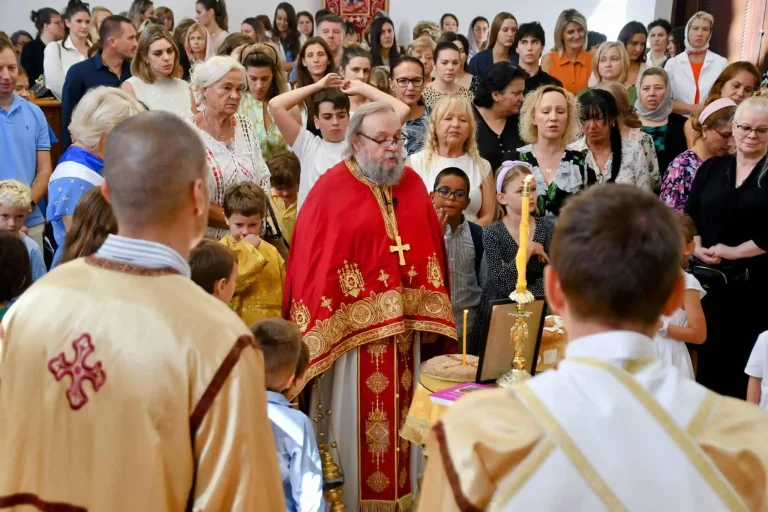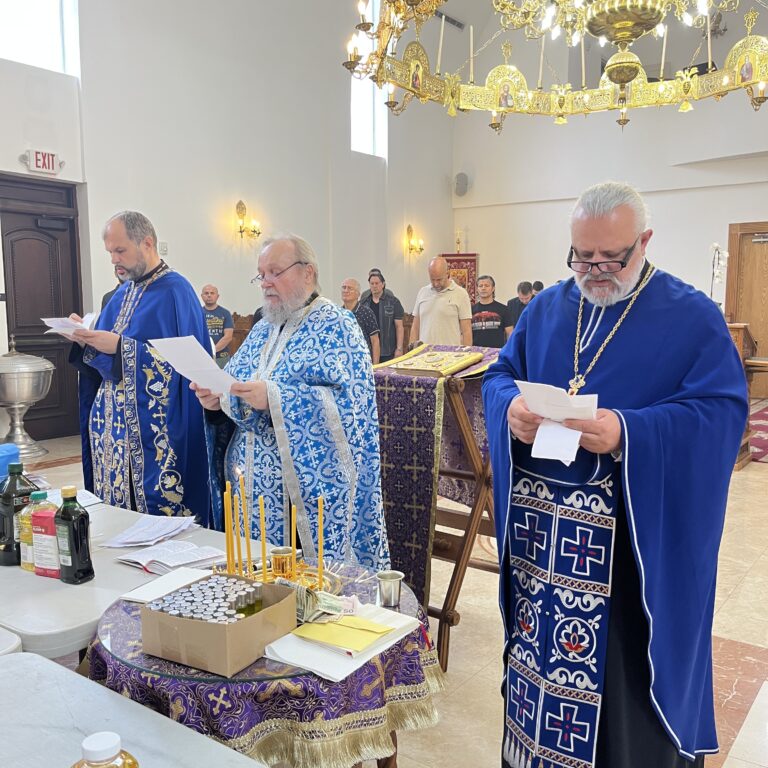
Communion
What is the holy sacrament of communion?
It is a holy sacrament in which devout Christians, under the appearance of bread and wine, receive the true body and blood of our Lord Jesus Christ.
Who instituted the holy sacrament of communion?
Our Lord Jesus Christ before His disciples at the Last Supper, on the eve of His suffering and death.
How did He institute this holy sacrament?
This is described in the Holy Gospel: “And as they were eating, Jesus took bread, and blessed it, and broke it, and gave it to the disciples, and said, Take, eat; this is my body. And he took the cup, and gave thanks, and gave it to them, saying, Drink ye all of it; For this is my blood of the new testament, which is shed for many for the remission of sins” (Matt. XXVI, 26-28).
During which liturgical service is the holy sacrament of communion prepared and received in the church?
During the most important church service, which is called the Divine Liturgy.
Why is the Divine Liturgy the most important of all church services?
Because it depicts the entire drama of Christ’s life from His birth to His ascension to heaven.
What is the most important moment in the Divine Liturgy?
The consecration of bread and wine performed by the bishop or priest.
Why is this holy sacrament performed continuously in the church?
Because Christ commanded: “This do in remembrance of me” (Luke XXII, 19).
Why is it necessary for us to receive communion?
Because our eternal life depends on it. Christ said: “Whoso eateth my flesh, and drinketh my blood, hath eternal life; and I will raise him up at the last day” (John VI, 54).
What are the consequences of not receiving communion?
In that case we are in mortal danger, for the Lord said quite clearly: “Except ye eat the flesh of the Son of man, and drink his blood, ye have no life in you” (John VI, 53).
How should we prepare for the holy sacrament of communion?
Through fasting and prayer, confessing our sins and forgiving those who have sinned against us.
What do we receive through the holy sacrament of communion?
We receive the living Christ Himself into ourselves, and thus united with Him, we have eternal life, according to His words: “He that eateth my flesh, and drinketh my blood, dwelleth in me, and I in him” (John VI, 56). “He that eateth me, even he shall live by me” (John VI, 57).
Can this be explained by some comparison?
Children take milk from their mothers, which is actually the mother’s body and blood, but through this nourishment their bodies grow. Similarly, in Holy Communion we take the body and blood of Christ, and through this nourishment our souls grow and mature.
What else could be said about this food for our souls?
Our bodies are of the earth, therefore they are nourished by earthly food, but our souls are of heavenly essence, therefore they must be nourished by heavenly food. And Christ said of Himself: “This is that bread which came down from heaven” (John VI, 58).
How often should we receive communion?
At least four times a year (during the four fasting periods). But it is recommended to approach Holy Communion as often as possible, which depends on the readiness of the communicant. Communion during illness is especially important.
What prayer should we say before receiving the holy sacrament of communion?
“I believe, O Lord, and I confess that Thou art truly the Christ, the Son of the living God, who came into the world to save sinners, of whom I am the first. I also believe that this is Thy true and most pure Body and that this is Thy own most pure Blood. Therefore I pray to Thee: have mercy on me and forgive me my transgressions, committed voluntarily or involuntarily, in word, in deed, consciously and unconsciously, and make me worthy to partake without condemnation of Thy holy Mysteries for the forgiveness of sins and for eternal life.”
Holy Sacrament of Communion – Question
QUESTION:
I was recently baptized and many things in the Church are not yet sufficiently clear to me. For example, I heard that Holy Communion is the “holiest moment” in the life of an Orthodox Christian. Please explain to me what Holy Communion is and what we receive through it. I would like this most important question to become completely clear to me.
ANSWER:
Humility should be the fundamental virtue of every Orthodox Christian. It is the foundation and cornerstone of the entire edifice of our salvation that we build throughout our lives. You, although a beginner in faith, show this virtue at the very beginning of your question by acknowledging that “many things in the Church are not yet sufficiently clear” to you. For humility is indeed the knowledge of one’s imperfection, one’s ignorance, and one’s powerlessness. So you are on the right path to becoming a good Christian. If baptism is properly understood as spiritual birth, then this is quite natural. You are yet to grow in faith and in knowledge of the Son of God. Your desire to “immediately” understand and comprehend the full significance of Holy Communion, as noble as it is, is equally bold. If baptism, as we said, is birth for spiritual life, Communion is the perfection and crown of that life. Between these two moments is woven all the wealth and splendor of Christian truths and Christian virtues. They are conquered and acquired gradually, imperceptibly, just as a child imperceptibly grows and matures into an adult. Without all of this, it is difficult to fully understand and comprehend Holy Communion and its significance for us. Nevertheless, I will try to satisfy your noble desire as briefly and simply as possible and explain as much as words can accomplish. The method of “knowledge” (acquiring knowledge) in Orthodoxy is experience, personal experience. Having heard from Philip the news about the appearance of Christ the Messiah, and that from Nazareth, Nathanael expresses open doubt with the question: “Can there any good thing come out of Nazareth?” Philip gives him a short and clear answer to that doubt: “Come and see” (John 1:46). During the communion of the faithful, the choir most often sings: “O taste and see that the Lord is good,” which means that only by actively participating in that truly holiest mystery can we understand and feel “what Holy Communion is.” That knowledge, acquired through experience, cannot be transmitted to another through words (oral or written, it doesn’t matter). Therefore, everything we present as an answer to your question can at best satisfy only your intellectual side. So, Holy Communion is the holiest Mystery that the Lord Christ instituted and left to His Church as an inheritance. This holy Mystery was instituted at the Last Supper, immediately before Christ’s suffering and crucifixion on Golgotha. At that last Passover supper, Christ, among other things, blessed bread and wine, calling them His body and His blood, distributed them to His Disciples and Apostles (Matt. 26:26-28), and commanded them to do this in the future (Luke 22:19). This holy Mystery, in which we receive under the appearance of bread and wine the true Body and Blood of our Lord Jesus Christ, is called Holy Communion or Eucharist. It was and remains the center and heart of all God’s Mysteries in the Church. In all other holy Mysteries we become partakers of the uncreated energies of God, which are collectively called “God’s grace,” and which are necessary for us to grow in spiritual life, while in Holy Communion we become partakers of the very Body and Blood of the God-man Christ, we receive Him completely into ourselves and unite with Him in the most intimate and perfect way. Without Holy Communion of the Body and Blood of our Lord Jesus Christ there is no Christian and spiritual life. Those who worthily receive communion secure for themselves immortality and eternal blessed life. Through Holy Communion the Orthodox Christian constantly renews his covenant with the Lord Christ, and his vow to the Lord Christ given in holy baptism. We do this both as individuals and as the “People of God,” the “New Israel.” The Divine Liturgy, at which we receive communion, is a continuation of that First Last Supper, and its uninterrupted presence in the world. Although Christ instituted the holy Mystery of Communion at the end of His economy of human salvation, He had spoken about it often and mentioned it earlier. On one occasion He said to the Jews present: “Except ye eat the flesh of the Son of man, and drink his blood, ye have no life in you” (John 6:53), and then continued: “Whoso eateth my flesh, and drinketh my blood, hath eternal life” (John 6:54). That is what we receive from Holy Communion and through Holy Communion. And eternal life? What is that? – It is what eye has not seen, nor ear heard, neither have entered into the heart of man, the things which God has prepared for them that love Him. However, through Holy Communion we not only receive these ineffable and eternal spiritual goods but also become partakers in Christ’s life, death, and also in glory. For He further said: “He that eateth my flesh, and drinketh my blood, dwelleth in me, and I in him” (John 6:56). We become, therefore, fellow members of Christ’s body and co-heirs with Him of His eternal glory and blessedness, for He thus adopts us to His Father and our God. In Holy Communion an ineffable mystery is realized. Just as children, taking milk from their mothers, actually feed on the body and blood of their mothers, and thus grow, so we in Holy Communion take the Body and Blood of Christ and through this food our souls grow and mature. We said here “our souls,” for our bodies are of the earth and are nourished by earthly food, but our souls are of heavenly essence, therefore they must be nourished by heavenly food, for Christ said: “This is that bread which came down from heaven” (John 6:58). From what has been said it is clear that it is necessary for us to receive communion for growth in spiritual life and obtaining eternal and blessed life. However, how we should receive communion, how we should prepare for Communion so that it would truly be for us “for healing of soul and body and for eternal life,” and not “for judgment or condemnation,” as well as many other practical details are in the fasting section.


